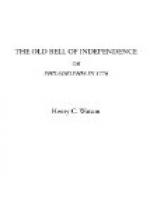“To be sure!” replied his wife, “and always were.”
THE DEAD MAN’S LAKE.
“Mr. Smith, can’t we have a leaf from your experience in those trying times?” said old Harmar.
“Ah! sir, I would have much to tell if I had time to collect my memory—much to tell, sir. But though I saw a great deal in the Revolution, I heard much more.”
“Tell us anything to pass time,” said young Harmar. “I’ve heard my father speak of some bold exploits up in the vicinity of New York. The history of the Cowboys and Skinners always interested me.”
“Ah! I’ve heard many a story of them,” replied Smith. “I’ll tell you of one old Jack Hanson told me—you recollect old Jack, don’t you, Harmar? He was with us at Valley Forge.”
“That I do,” replied old Harmer. “He gave me a piece of his blanket, and an old shoe, when I believe I was freezing to death.”
“Yes, he was ever a good-hearted fellow—Jack Hanson was. He’s been dead now about ten years. Well, as I was saying, he told me a story about those Cowboys and Skinners which will bear telling again.”
“It happened when the British were in possession of the city of New York. Many brave men did all that could be done to destroy the power and comfort of the king’s representatives, and alarm them for their personal safety; and, to the greater part of them, the neighboring county of West Chester furnished both the home, and a theatre of action. Their system of warfare partook of the semi-savage and partisan predatory character, and many fierce and desperate encounters took place between them and the outlawed hordes of desperadoes in the pay of the British.
“The refugees, banded together for the purpose of preying upon the patriots, and then retreating behind the shelter of the royal fortifications, were composed of the vilest miscreants that could be gathered from the dregs of any community, and were generally known by the slang name of ‘Skinners.’
“To oppose these desperadoes, and protect their lives and property from insult, many of the whigs had united in small parties, and were styled by the Skinners, in derision, the ‘Cow-boys.’ One of the most active and energetic of these bands, ever ready for any species of patriotic duty, was led by Nicholas Odell. Nick, as he was familiarly termed, though entirely uneducated, was one of the shrewdest men to be found; for Nature had gifted him where cultivation was wanting, and he became, in consequence, a most formidable and dangerous enemy in the service he had chosen. But fifty men composed his entire force, and with these he did his country much service, and the enemy no little mischief.
“The line of the Bronx River was the route always kept in view by Nick and his men; and, at six several points, places of rendezvous were established, at which they were generally to be found when off duty, which was, indeed, seldom the case.




